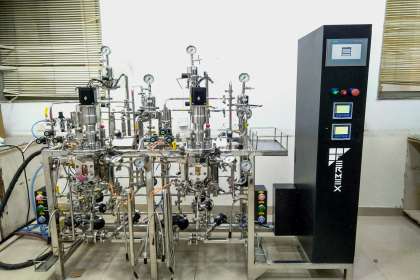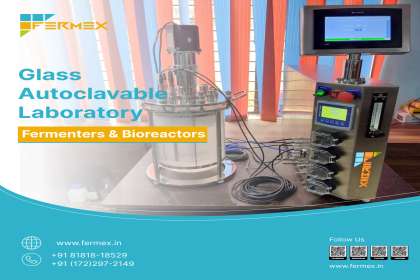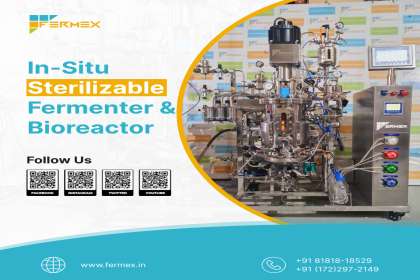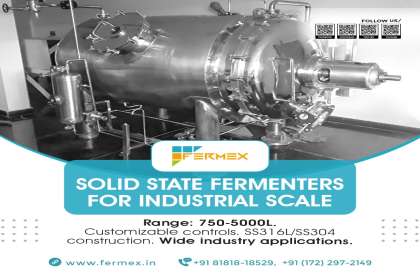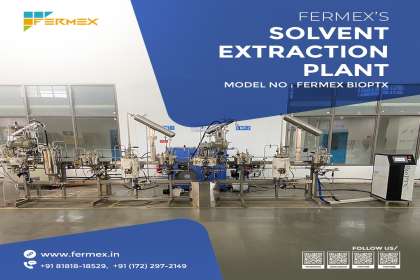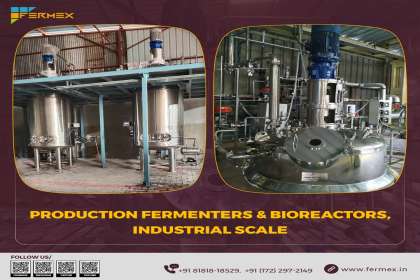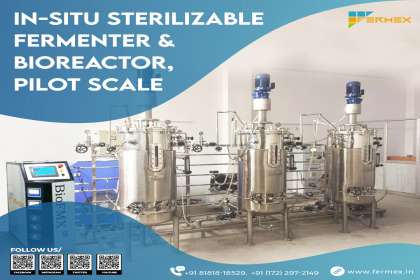
Fermenters play a pivotal role in experimental laboratories by facilitating controlled and efficient fermentation processes. These specialized vessels provide a controlled environment for the growth of microorganisms, enabling the production of various products like biofuels, enzymes, and pharmaceuticals.
With precise temperature, pH, and agitation control, fermenters ensure optimal microbial growth and product yield. Their versatility makes them indispensable tools in biotechnology research, allowing scientists to explore and harness the potential of microbial-based technologies.
Key stages involved in use of fermenters and bioreactors in experimental laboratories.
The use of fermenters and bioreactors in experimental laboratories involves several key stages:
- Inoculation: The process begins by introducing a specific microbial culture or cells into the fermenter or bioreactor. This inoculation kick-starts the fermentation process.
- Growth and Fermentation: The microorganisms or cells grow and multiply within the vessel. During this stage, nutrients, oxygen, and other essential parameters are carefully controlled to support optimal microbial growth and product formation.
- Monitoring and Control: Throughout the fermentation process, various parameters such as temperature, pH, dissolved oxygen, and agitation are continuously monitored and adjusted to maintain the ideal conditions for the microorganisms’ growth and product synthesis.
- Harvesting: Once the fermentation reaches its endpoint or desired product concentration, the culture is harvested from the fermenter. The product may be in the form of biomass, metabolites, enzymes, or other valuable compounds.
- Product Recovery and Purification: Depending on the type of product, additional steps may be required to purify and concentrate the desired substance from the fermentation broth.
- Sterilization and Cleaning: After each fermentation run, the fermenter or bioreactor must be thoroughly cleaned and sterilized to ensure aseptic conditions for subsequent experiments.
- Scale-up and Optimization: Successful results from small-scale fermenters may lead to the need for scale-up to larger bioreactors to meet industrial production demands. The process is continually optimized to enhance yield, productivity, and cost-effectiveness.
- Data Analysis and Reporting: Experimental data from each stage are collected, analyzed, and reported to assess the performance of the fermenter or bioreactor and the quality of the final product.
These key stages are crucial for the successful use of fermenters and bioreactors in experimental laboratories, enabling researchers to carry out a wide range of biotechnological applications effectively.
Fermex Solutions LLP manufactures fermenters that can be used for this application.
Benefits of Fermenters in the experimental laboratories.
Fermenters offer several benefits in experimental laboratories, making them indispensable tools for biotechnological research and production:
- Controlled Environment: Fermenters provide a controlled environment for microbial growth and product formation, allowing researchers to optimize various parameters such as temperature, pH, dissolved oxygen, and agitation. This control ensures consistent and reproducible results.
- Enhanced Productivity: With the ability to support large-scale microbial growth, fermenters enable higher product yields compared to traditional flask cultures. This increased productivity is essential for industrial applications.
- Versatility: Fermenters can be used with various microorganisms, including bacteria, yeast, fungi, and algae, making them suitable for a wide range of applications such as pharmaceuticals, biofuels, enzymes, and bioplastics.
- Automation: Many modern fermenters come equipped with automated systems for monitoring and controlling parameters. This automation reduces the need for manual intervention and ensures precise and efficient processes.
- Reduced Contamination Risk: Fermenters provide a closed system that minimizes the risk of contamination from external sources, ensuring aseptic conditions for sensitive cultures.
- Real-Time Monitoring: Advanced fermenters allow real-time monitoring of key parameters, enabling researchers to promptly detect and respond to any changes or deviations during the fermentation process.
- Scale-Up Capability: Successful experiments in small-scale fermenters can be easily scaled up to larger bioreactors, facilitating the transition from research to industrial production.
- Resource Efficiency: Fermenters optimize the use of resources, such as media and energy, by controlling the process parameters, leading to reduced waste and cost-effective production.
- Time Savings: The controlled and efficient nature of fermenters accelerates the growth and production of microorganisms, significantly reducing the time required to obtain the desired product.
- Environmental Benefits: Fermenters play a role in sustainable bioprocessing, as they enable the production of eco-friendly products, such as biofuels and biodegradable materials, contributing to a greener future.
Overall, the benefits of fermenters in experimental laboratories lie in their ability to provide a reliable and efficient platform for microbial-based research, product development, and industrial applications.








